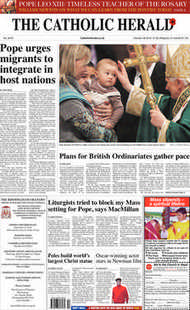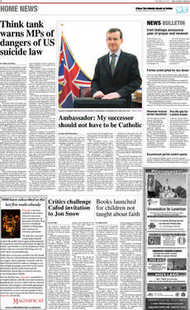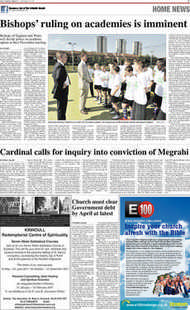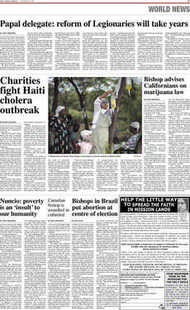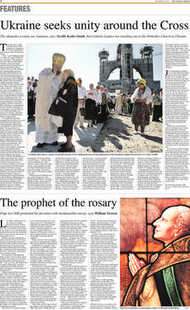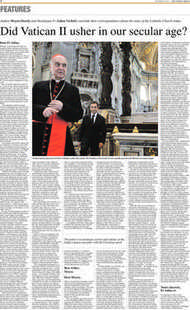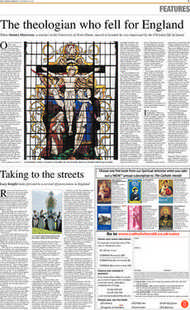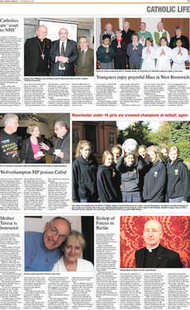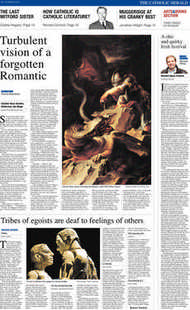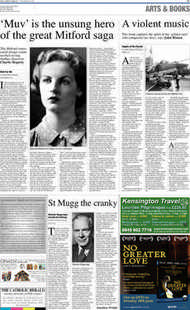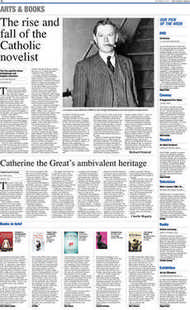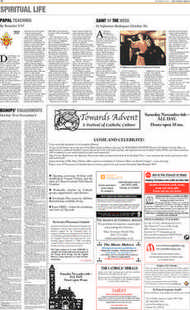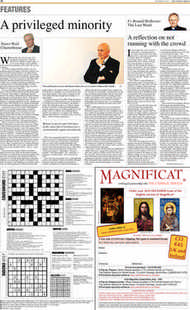Page 9, 29th October 2010
Page 9
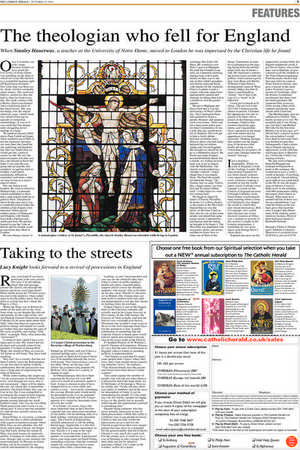
Report an error
Noticed an error on this page?If you've noticed an error in this article please click here to report it.
Tags
Share
Related articles
Douglas Hyde's Column
France's Fall From Greatness
How Our Parish Does It . .
Witnessing A New Dawn Of The Spirit In Walsingham
Sermons
Taking to the streets
ucy Knight looks forward to a revival of processions in England Raise your hand if you have processed with your church this year. I’m not talking about that safe passage around the church, but through the houses and down your high street? Many hands going up? Or does everyone run to the shadows when called upon to let the public know that you believe in God and don’t think the Pope is a Nazi.
While the Pope was in Britain he spoke of the need not to shy away from what we are despite the ridicule and parody. In the wake of his visit Archbishop Vincent Nichols has urged Catholics to be more open about their faith. There has been an injection of positive energy and maybe we could go further than just making the sign of the cross in public and saying “God bless” to people. Well, what about the “procession”?
I confess I don’t think I have ever taken part in one. My school did not do them and certainly none of the parishes I’ve been in during Holy Week, the month of May or even on All Saints or All Souls’ Day have held anything.
Why not? As a country that has not been Catholic since the Reformation, we are not used to openly Catholic celebrations. But the procession was once a huge part of expressing the faith of believers.
While some reading this might say “we do a procession on Good Friday every year through our town, this is not uncommon”, there will be others, like me, for whom this is unfamiliar territory. On Good Friday this year, as I sat in my flat, I was compelled to investigate the sound of loud singing. It was a small parade of about 15 people passing through my south London estate. This was my first Holy Week procession and I wasn’t even taking part. It was a moving reminder of what the day actually means for Christians.
Good Friday is, of course, a solemn day but one that is often celebrated with a quiet ecumenical parade. Other Holy Days in our calendar, like All Souls and Corpus Christi, not forgetting Our Lady during the month of May, also tend to pass by relatively quietly. Compare us with other countries, though, and we are certainly the most restrained. In Havana on Good Friday you’ll be crushed by the crowds and deafened by the singing; Poland on All Souls and you’ll have a national holiday and a visit to the graveyard; in Spain for Corpus Christi you’ll be parading through the towns with pomp. They seem to have a lot of fun there. Here, on the days that follow the commercially popular All Hallows’ Eve, there isn’t a party or banner in sight.
In Oberammergau they have been enacting the Passion for over 400 years as a result of a promise made to God. A man is chosen to play Christ, stripped down to a loin cloth, and carries a cross – not exactly something the average British male would easily be persuaded to do. It is an outstanding example of faith and will. Consequently it is visited by thousands from all over the world.
It is Easter, of course, that is the most important date in the Christian calendar but one when most members of the public will be thinking only of a bank holiday weekend and chocolate eggs. The Church of England has recently announced it will be selling Easter eggs. Apparently it is the first time that Jesus has been mentioned on one. Maybe it is a step in the right direction, but at the same time it panders to consumerism. A procession down your high street on Good Friday, reminding everyone what the weekend stands for, will perhaps have a more lasting effect than a chocolate egg. Looking at one’s local parishes and you can see the obstacles they face when it comes to public displays: health and safety, required police support and of course the dreaded motorist, who doesn’t like to be held up for any cause. Maybe it’s because we’re British. Our climate does not lend itself to outdoor festivities and our temperament is not one that shouts its feelings from the rooftops.
Corpus Christi is one of the biggest dates in the Christian calendar and actually used to be a huge festivity in this country. In the 16th century the Council of Trent actually said that the festival was a triumph over heresy. Obviously one wouldn’t want to go so far as to use such language these days, but the sentiment is true. A public celebration of something that the Catholic Church is based upon would enliven spirits and remind everyone else of the active faith of the Church.
Fr Stephen Pimlott of St Wulstan’s and St Thomas of Canterbury, Worcester, says that the lack of enthusiasm in England when it comes to parading publicly is understandable.
“Our history is such that for many years people didn’t know where they were, they were careful about expressing religious views,” he explains. “This entered deeply into the psyche and forced recoveries haven’t really worked.” This could explain the number of people who will dip out when there is a procession down the high street. As Fr McGinley of St George’s, Worcester, points out: “In the old days there was safety in numbers and in the secular atmosphere of today it can be intimidating for people. It’s like shaking a tin for charity: people are happy to give to the charity but to actually stand outside the supermarket yourself is something else.” Despite being someone who has never actually taken part in one of these processions, I think this really is a brilliant way to get people involved. I believe that not only would the processions act as a tool for the Church to galvanise their own congregations but also serve as a reminder for the general public that the Catholic Church is very much alive and well. For the young, also, it could act as a way of learning to take courage from their faith and not be afraid to proclaim a belief. Let’s trade in the witches’ outfits for a palm.
blog comments powered by Disqus


